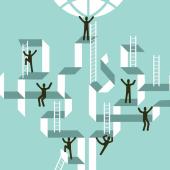Will AI Replace Coaches and Psychologists?
I recently heard that coaches and helping professions like social workers are considered the last refuge against the "fact" AI. But now AI is learning so fast it can theoretically learn and replace any human task. Even being empathetic!
Research from Harvard University recently suggested coaching can soon be automated. AI comes in many forms, from those little chatbots on websites to Alexa and many other automations that are proactive like the programs in Tesla that the driver talks to. But advances in conversational AI mean we can now have conversations with technology that makes us ‘feel’ we are talking to a human that really listens and responds "intelligently."
So what?
People still want to connect to people!
The work of a coach or health care professional requires extensive professional, empathic, psychological, and other skills like human intuition. How could these replace or even replicate a coach's skillset soon? Academics at business schools like NYU Stern suggest there are specific categories of being a professional executive or business coach: 1. assessment, 2. intervention, 3. supporting sustained behavioral change. But many of these are already automated—to some degree.
The technology may not be perfect yet, but it is developing at such a significant rate that some AI technologies will have the ability to hold a conversation and be more empathetic than some real humans, like psychologists. This is especially true if they apply CBT (cognitive behavior therapy) tools, as these can be easily standardized and are very effective for concerns like anxiety disorders and phobias helping them feel happy again.
A profession in denial?
As mentioned, AI and other online technologies are already disrupting the coaching industry with a significant impact on employment, professional development, and education and continue to improve daily! AI is clearly invading the job field of coaching.
There is a huge range of AI-driven coaching health apps that are already doing great in the marketplace. Several use a cognitive behavioral therapy (CBT) or cognitive-behavioral coaching (CBE) protocol widely considered the best model for behavior change.
These apps usually use AI conversational tools like chatbots but with machine learning capabilities so they are always learning and improving, to provide a form of dialogue. Research on the technology has already shown great promise where millennials actually prefer AI as it increases anonymity and instant gratification, not having to wait for an appointment. Many of this generation are not given the opportunity to have a personal human coach due to the expense.
AI can analyze data collected from apps that can be more proactive and offer personalized programs. For instance, AI apps can help improve treatment by early intervention when someone is experiencing more severe symptoms. IBM is using transcripts from psychiatric interviews and is finding out speech patterns that can accurately predict the onset of depression.
In the competition for valued employees, companies now see well-being and productivity programs as crucial. Many companies are delivering innovative solutions: AI coaching will be an important and inexpensive part of the solution to well-being and productivity. Of course, the solution will still involve people too—but it will only involve people willing and able to embrace technology and build on what the technology can do.
AI coaching may not be the same experience as human coaching, but who says it needs to be? Listening to music is something humans have been doing for centuries—how we do that and with what technology has changed and will continue to. If an AI coaching session has the ability to inspire new ways of solution-focused thinking to challenges individuals face, it will be as successful as many coaching sessions.AI deployment is rapidly accelerating
It seems there are certain things that accelerate the change. Deep learning algorithms and advanced predictive analytic systems threaten the relevance of many industries. Based on their ability to collect and immediately refer to the client's data and their situation, AI is able to help clients come to their solutions maybe even better, if the experience "feels" authentic. If you had the choice to use a professional coach or a bot, you’d probably select the coach. But what if the coach can only see you next week and the bot costs only 1% of the cost and ready right now, you might just give it a go right?
The second factor is that AI predictive and analytic skills will soon be better than human abilities. Human judgment in many ways is slower. Cognition often needs time for the coach to digest before they respond. Stress has never been higher and as a result, many coaches suggest their clients use meditation apps like Headspace to help in between sessions. It seems coaches are already handing over their clients to AI. And clients will are happy to engage in the technology often replacing coaches, like those coaches who offer mindfulness coaching. At the very least, the improved proficiencies will boost the number of clients that can be handled by AI.
How will coaches survive?
In the Orwellian future, how many human coaches will society actually require? One AI platform that can handle millions of clients at a time is all that’s needed perhaps. It seems certain the work of most coaches can be replaced in at least in part by AI. Does this mean human psychologists should be replaced by AI?
Many of us coaches may feel uncomfortable right about now. Many will negate that AI is anywhere close to being ready to replace them, even though many coaches already outsource many services to AI. If an AI-based solution is more effective, quicker and cheaper, more reliable and should a client adopt or at least test it? The impact upon the employment, training, and education of coaching professionals looks dismal. That is if coaching professionals don’t beat AI at their own game. Coaching professionals need to creatively think ahead before AI can.
Certain actions to improve the situation for a coach include an understanding of how humans and machines can work together in the assessment and intervention process, in order to find more creative solutions with your clients based on the AI data. Encourage the application of AI technology among your clients, so that they see you are the purveyor of relevant solutions they need.
Heads in the sand?
To willfully ignore these trends, sadly looks like extinction. What if using AI coaching allows our clients to jump into a much deeper richer experience when with a human coach? What if the client has so much more to explore and their hour with the coach ends? Maybe not today, but think about the last time you used an app that has now replaced an expert human opinion. Today I used a language training app as I now live in Germany. Last year I went to German-speaking classes. Today I used an app and met my bot teacher in bed. I then asked Siri to find me some information about some new words I didn’t understand that would have taken me ages if I had to find an encyclopedia on my bookshelf.
What apps did you use this week that you never imagined might exist five years ago that now make you feel better about your life? If you aren’t that sure, simply ask Alexa. Time to take action before AI does that for you, too.






